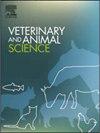Quercetin as a bioactive feed additive: nutritional, antioxidant, and gut health implications in poultry and rabbits
IF 1.9
Q2 AGRICULTURE, DAIRY & ANIMAL SCIENCE
引用次数: 0
Abstract
Quercetin is a bioactive flavonoid widely distributed in vegetables, grains, and fruits, known for its powerful anti-inflammatory, immunomodulatory, and antioxidant properties. Recently, it has attracted increasing attention as a sustainable and functional additive in animal nutrition. This review explores the existing understanding of the use of quercetin in poultry and rabbit diets, focusing on its impact on growth efficiency, intestinal health, antioxidant, immune function, and the quality of animal-derived foods. In rabbits, dietary supplementation with quercetin (25–100 mg/kg diet) has been associated with enhanced feed efficacy, meat composition, and gut microbial balance. In poultry, including broilers and laying hens, quercetin (up to 200 mg/kg) enhances growth under normal and heat stress conditions, improves meat and egg quality, and modulates oxidative stress markers and gut microbiota. These effects are connected to how quercetin helps control the activity of genes that deal with inflammation, antioxidant enzymes, and the immune system in the gut. Importantly, the review emphasizes the potential of quercetin to improve the nutritional and functional quality of meat and eggs, making it highly relevant for human health and food sustainability. Further studies are encouraged to define optimal dosages and explore synergistic effects with other natural additives. This review offers critical insights into how dietary quercetin can be utilized to support animal health, efficiency, and food product quality, aligning with the global shift toward natural, residue-free feed strategies.
槲皮素作为生物活性饲料添加剂:对家禽和家兔的营养、抗氧化和肠道健康的影响
槲皮素是一种生物活性类黄酮,广泛存在于蔬菜、谷物和水果中,以其强大的抗炎、免疫调节和抗氧化特性而闻名。近年来,它作为一种可持续的功能性添加剂在动物营养中受到越来越多的关注。本文综述了目前对槲皮素在家禽和家兔饲粮中的应用的认识,重点介绍了槲皮素对生长效率、肠道健康、抗氧化、免疫功能和动物性食品质量的影响。在家兔中,饲粮中添加槲皮素(25-100 mg/kg)可提高饲料效率、肉成分和肠道微生物平衡。在包括肉鸡和蛋鸡在内的家禽中,槲皮素(高达200 mg/kg)可在正常和热应激条件下促进生长,改善肉和蛋品质,并调节氧化应激标志物和肠道微生物群。这些效果与槲皮素如何帮助控制肠道中处理炎症、抗氧化酶和免疫系统的基因活性有关。重要的是,该综述强调了槲皮素在改善肉和蛋的营养和功能质量方面的潜力,使其与人类健康和食品可持续性高度相关。鼓励进一步研究以确定最佳剂量并探索与其他天然添加剂的协同效应。这篇综述为如何利用膳食槲皮素来支持动物健康、效率和食品质量提供了重要见解,与全球向天然、无残留饲料战略的转变保持一致。
本文章由计算机程序翻译,如有差异,请以英文原文为准。
求助全文
约1分钟内获得全文
求助全文
来源期刊

Veterinary and Animal Science
Veterinary-Veterinary (all)
CiteScore
3.50
自引率
0.00%
发文量
43
审稿时长
47 days
 求助内容:
求助内容: 应助结果提醒方式:
应助结果提醒方式:


